Vitamin D Deficiency is Very Common in Hashimoto’s Patients (And a Big Problem)
What do sunlight, winter, and how you are feeling have in common?
They all have an impact on your vitamin D level.
Vitamin D is a crucial nutrient that acts more like a hormone than a vitamin and it helps to regulate a number of different systems in your body.
Vitamin D has an impact on your immune system, your thyroid, your risk of cancer, your mood, your bone density, and much more.
As you can imagine, optimizing this important vitamin hormone is ideal if you want to have adequate thyroid function.
Unfortunately for anyone reading this, cases of vitamin D deficiency are on the rise and at record numbers.
It’s currently estimated that as much as one-third of the entire population of the world (1) may not have sufficient vitamin D levels.
When it comes specifically to Hashimoto’s patients, some studies show that as many as 76% of patients (2) are deficient in vitamin D!
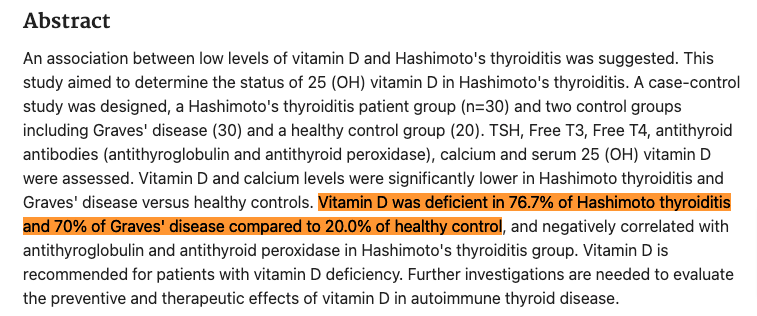
These types of numbers are just mind-boggling, especially when you consider the impact that this one deficiency has on our healthcare system.
But if you are reading this then you probably already know at least a little bit about why vitamin D is so important.
After all, it’s frequently recommended as a superstar vitamin for those with Hashimoto’s thyroiditis (and thyroid disease of any type).
That’s why this article exists, to discuss whether or not you should use vitamin D if you have Hashimoto’s, how much you should take, the best way to get it, and much more.
Let’s dive in…
DOWNLOAD FREE RESOURCES
Foods to Avoid if you Have Thyroid Problems:
I’ve found that these 10 foods cause the most problems for thyroid patients. Learn which foods you should avoid if you have thyroid disease of any type.
The Complete List of Thyroid Lab tests:
The list includes optimal ranges, normal ranges, and the complete list of tests you need to diagnose and manage thyroid disease correctly!
Benefits of Vitamin D On Thyroid Function in Patients with Hashimoto’s
Before we talk about how much vitamin D you should or shouldn’t take we should take a minute to talk about the potential benefits of using vitamin D as it relates to your thyroid.
Luckily for us, vitamin D is one of the most well-studied vitamins/hormones out there so there are plenty of studies to look at.
These studies show the impact that vitamin D may have on your thyroid function.
This information is helpful because it can let you know what to expect if you plan on taking vitamin D.
The potential benefits of taking vitamin D if you have Hashimoto’s include:
#1. Protects Against Thyroid Autoimmunity
It is well known that vitamin D helps to regulate your immune system.
Low vitamin D levels have been shown to increase your individual risk of developing several different types of autoimmune diseases (3) including Hashimoto’s thyroiditis.
We also know that there is some correlation between your risk of getting sick and your vitamin D level.
The lower your vitamin D level the more likely you are to get sick and the more likely you are to develop a range of autoimmune conditions.
Just because your vitamin D level is low doesn’t guarantee that these things will occur but it does slightly increase your risk.
For most of you reading this, the damage has probably already been done.
In other words, it’s less about prevention and more about management now.
The good news is that optimizing your vitamin D level is still a good idea even if you’ve already been diagnosed with Hashimoto’s.
Remember:
Hashimoto’s is primarily a disease of your immune system which results in thyroid gland inflammation and thyroid gland damage.
Optimizing vitamin D levels may, therefore, provide you with a way to calm down this inflammation and prevent or at least slowdown thyroid gland damage.
The extent of this benefit is not clear and doesn’t appear to work for everyone with Hashimoto’s but it’s always a good idea to restore deficiencies (4) if present.
So even if taking vitamin D doesn’t result in a drop in your thyroid antibodies it’s still worth it for the benefit it has on your overall health.
#2. TSH is Negatively Correlated with Vitamin D Levels
Next, we know that vitamin D and TSH levels seem to have a negative correlation with one another.
What does this mean?
It means that as vitamin D decreases your TSH may increase and, on the flip side, it also means that as vitamin D increases your TSH may decrease.
Let’s make some sense of that statement.
TSH stands for thyroid-stimulating hormone and it’s the hormone that doctors frequently use to check how well your thyroid is working.
A low TSH is usually indicative of hyperthyroidism (too much thyroid) and a high TSH is usually indicative of hypothyroidism (too little thyroid).
In patients with Hashimoto’s thyroiditis, a high TSH is usually an early sign that your body is attacking and causing problems for your thyroid gland.
So when a patient takes vitamin D and sees a decline in TSH (to normal healthy levels) this is a good thing!
It means that the thyroid is functioning better on its own.
Changes in TSH levels are always relative to where they started but you can generally think about anything that lowers TSH naturally to be a good thing for Hashimoto’s patients (it means the thyroid is working better on its own).
Is there a catch here?
A little bit.
It seems that vitamin D only has an impact on those who already have vitamin D deficiency (5).

In other words, taking vitamin D if your vitamin D level is already normal most likely will not boost your thyroid.
But with deficiency rates as high as 76%, the odds are definitely on your side.
In addition, this benefit occurs with higher than average doses which do slightly increase your risk of hypervitaminosis D.
As long as you understand optimal ranges (which we will talk about later) this isn’t a big issue, though.
#3. Free T3 and Free T4 are Positively Correlated with Vitamin D Levels
Much like TSH, researchers have found that there is a positive correlation between free T3, free T4, and vitamin D.
This situation is a bit easier to understand than the TSH situation because free thyroid hormones are important for regulating thyroid function.
In general, you want your free T3 and free T4 levels to be optimized if you want your thyroid to function correctly.
The higher your free T3 and free T4 the better (as long as they don’t go outside of the reference range).
Unfortunately, the link between vitamin D and free thyroid hormone levels is not as straightforward as you might think.
What we know is this:
Lower free thyroid hormone levels (of both fT3 and fT4) increase your risk of developing vitamin D deficiency.
What we don’t know is which comes first or which one causes the other.
It may be the case that as Hashimoto’s progresses, and your free thyroid hormone levels drop, it is this drop then causes a decrease in vitamin D.
It could also be the case that vitamin D deficiency comes first and causes a direct drop in free thyroid hormone levels.
Regardless of which comes first, it’s still a good idea to optimize your vitamin D status so that both your vitamin D and thyroid can work together in tandem.
Just don’t necessarily expect a huge bump in your free thyroid hormone levels when you use vitamin D supplements.
How Much Vitamin D Should You Take?
Hopefully, these benefits were enough to get you excited about using vitamin D which brings us to our next question:
How much vitamin D should you take if you have Hashimoto’s and want to supplement?
I wish I could give you a straightforward answer but because vitamin D levels vary from person to person that is a lot harder than it sounds.
Instead, what I can do is give you some general guidelines to follow which will help you determine the best dose for your body which will help you avoid taking too much and experiencing any unwanted side effects.
Unlike some other vitamins and nutrients out there, it is possible to take too much vitamin D.
Vitamin D is considered a fat-soluble vitamin so it’s not as readily excreted by your body as water-soluble vitamins like B vitamins.
Having said that, it’s easy to avoid over-supplementation as long as you are keeping an eye on your vitamin D levels (more on that below).
When using vitamin D for Hashimoto’s, here are a few guidelines to follow:
- Before using vitamin D supplements, test your vitamin D level with the 25-hydroxy vitamin D test to see your starting point.
- Vitamin D dosing for Hashimoto’s patients ranges from 1,000 IU per day to 10,000 IU per day.
- A safe daily dose is usually around 2,000 IU to 3,000 IU per day.
- Taking your vitamin D with a fatty meal can help increase absorption.
- If you are taking vitamin D daily and not seeing an increase in your level then try taking it with magnesium (magnesium can help boost vitamin D levels).
- Liquid vitamin D (vitamin D drops) may be better absorbed compared to capsules/tablets.
- Use a vitamin D3 supplement (not a vitamin D2 supplement).
- Once you’ve been using vitamin D for 2-3 months, get retested to see how much you’ve increased.
- Try to optimize your 25-hydroxy vitamin d level somewhere between 40-60 ng/mL (the reference range is 30-100 ng/mL).
If this information is more confusing than helpful then most people are pretty safe to start with a dose of around 2,000 IU per day!
The Best Form of Vitamin D for Hashimoto’s
There are two main forms that vitamin D supplements come in and one is definitely better than the other.
The two forms include:
- Vitamin D2
- and Vitamin D3
When it comes to supplementing, vitamin D3 is the superior form.
Vitamin D2 tends to come from plant sources, is cheaper to produce, and may be of lesser quality compared to D3.
In addition, studies show that vitamin D3 is more potent at raising 25-hydroxy vitamin D levels compared to the D2 version.
This has to do with how your liver metabolizes D2 and D3.
The metabolism of D3 in the body results in more 25-hydroxyvitamin D3 than D2 even at equivalent doses.
When it comes to quality, D3 wins again.
Vitamin D2 is more susceptible to temperature changes and humidity which means that vitamin D2 supplements likely don’t last as long as D3 supplements.
If you are taking a vitamin D supplement then check to make sure you are using the D3 formulation and not the D2 formulation.
You’ll know if you are using the right formulation because the supplement fact panel on the back of your supplement will say cholecalciferol (which is D3).
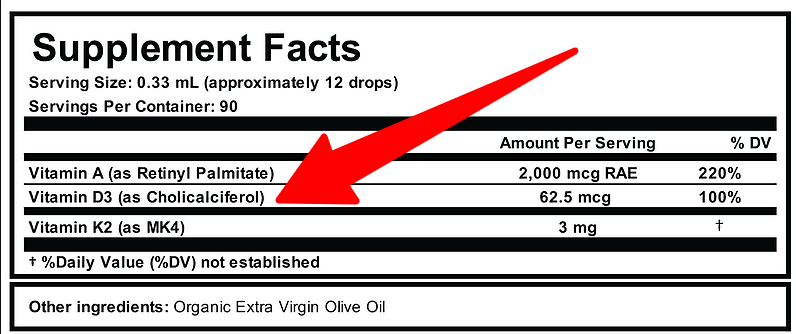
If your supplement fact panel says ergocalciferol then you are using the D2 formulation.
The Best Way To Test For Vitamin D Deficiency
There are several ways to assess your vitamin D status and each test has a different purpose.
When it comes to testing for vitamin D deficiency the best test is 25-hydroxyvitamin D (6).
The other vitamin D tests can be used to assess how well you are responding to treatment but should not be used to diagnose a deficiency.
These tests include:
- 1,25-dihydroxy vitamin D (7) – This is the active metabolite form of vitamin D but your body only converts a small percentage of your total vitamin D to this metabolite as necessary. As a result, 25-hydroxy vitamin D is still a better marker of overall vitamin D status.
- 25-hydroxy vitamin D2 (8) – This represents the amount of vitamin D2 your body has absorbed from plant sources.
- 25-hydroxy vitamin D3 – This is the amount of vitamin D3 your body has absorbed from animal sources or from supplements.

The 25-hydroxy vitamin D2 and D3 metabolites may be helpful in cases where you are taking supplements and not seeing an increase in your 25-hydroxy vitamin D status.
They are typically not recommended for monitoring, though, and are really only used in specific cases.
The test you want to get before you supplement is 25-hydroxy vitamin D.
Vitamin D Supplements vs The Sun
Even though you can get an active vitamin D metabolite (D3) from supplements, there may be a better source:
The sun.
When UVB rays from the sun hit your skin they activate cholesterol which transforms it into vitamin D.
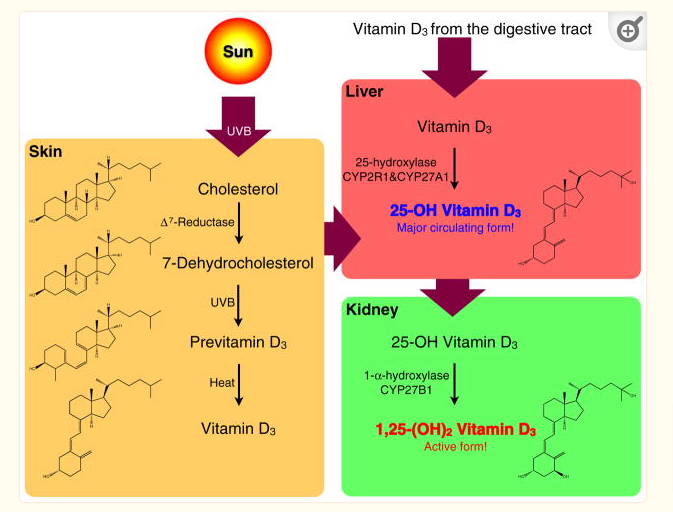
This process is so effective that in as little as 30 minutes your body can create the equivalent of 10,000 to 20,000 IUs (9) of vitamin D in supplement form!
In addition, you also get the added benefits of healthier skin (10) (via the prevention of several skin conditions), better regulation of your mood (11), and regulation of your circadian rhythm (12).
Getting vitamin D from the sun is not as easy as it sounds, though, because there are many factors that can reduce how effective sun exposure can be for vitamin D synthesis.
If you want to get vitamin D the all-natural way then you need to follow these instructions:
- Spend 10-20 minutes in the sun each day when the sun is directly over your head. If you go outside and the sun casts a shadow taller or longer than your body then the angle of the sun is not ideal.
- Expose at least 40% of your body to sunlight. This ensures enough surface area that the UVB rays can activate vitamin D in your skin.
- Avoid using sunscreen! Sunscreen will block UVB rays which means they won’t help you create more vitamin D.
- Avoid going out in the sun if it is overcast. Clouds block UVB rays which means you won’t create vitamin D.
The latitude at which you live (13) also impacts how effective sun exposure is at creating vitamin D.
The closer you are to the equator the more likely sun exposure is to benefit you.
The farther north or south you are from the equator the less effective sun exposure is at creating vitamin D.
At some extreme latitudes (north or south), you may have no option but to use vitamin D supplements.
Final Thoughts
Not only does vitamin D play an important role in your overall health but it also helps to regulate and control several aspects of thyroid function.
These aspects are all crucial to maintaining a healthy thyroid gland that is free from inflammation, disruption of thyroid hormones, and disruption of pituitary hormones.
Because so many patients with Hashimoto’s thyroiditis suffer from vitamin D deficiency and because of its impact on both the thyroid and immune system, using vitamin D supplements may be an easy way to reverse a deficiency.
Before using vitamin D supplements make sure you check your vitamin D level with a 25-hydroxy vitamin d lab test.
Once you have your results you can determine if you need to use a vitamin D3 supplement (which is the best form).
Keeping an eye on your vitamin D lab tests is a great idea if you start supplementing to make sure you don’t take too much.
If you are planning on using a vitamin D supplement then I would recommend using one like this which combines other ingredients that support your thyroid and the regulation of calcium in the body all at once.
Now I want to hear from you:
Did you know that taking vitamin D may help reduce your thyroid antibodies or increase your free thyroid hormones?
When was the last time you had your vitamin D level checked?
Were you in the optimal range?
Are you planning on getting tested after reading this?
Leave your questions or comments below!
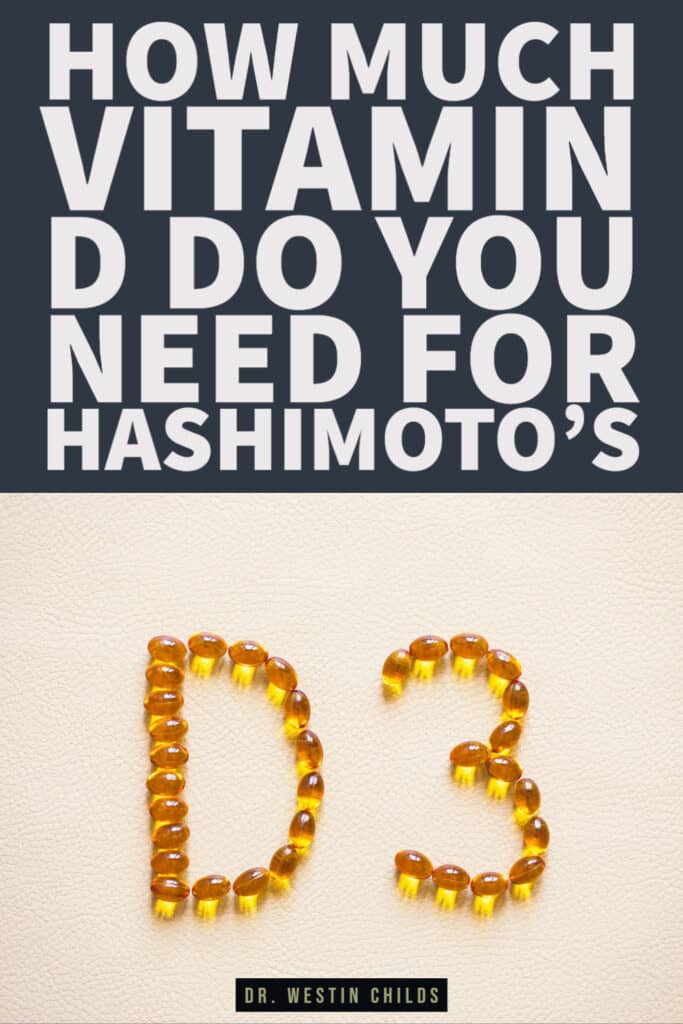
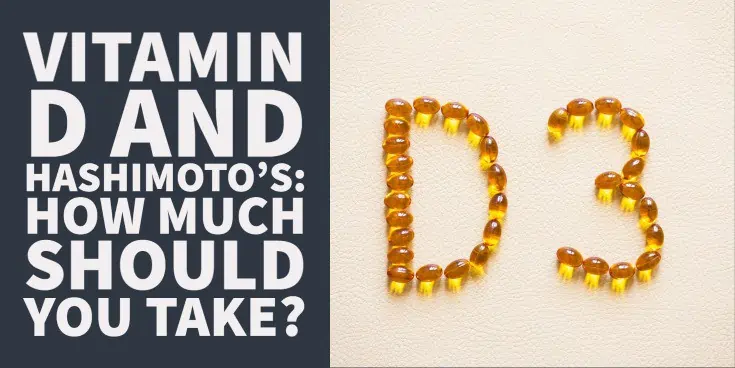


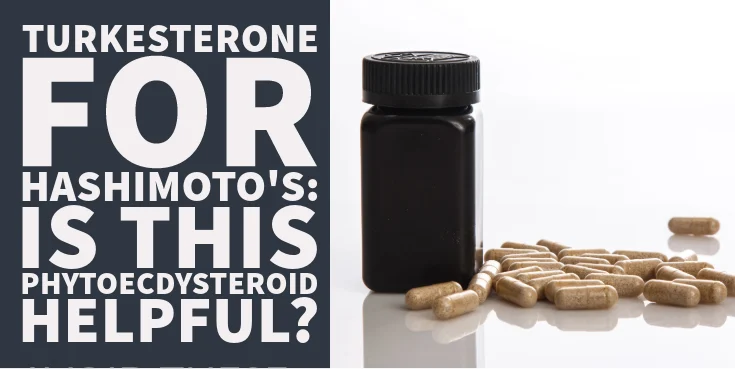

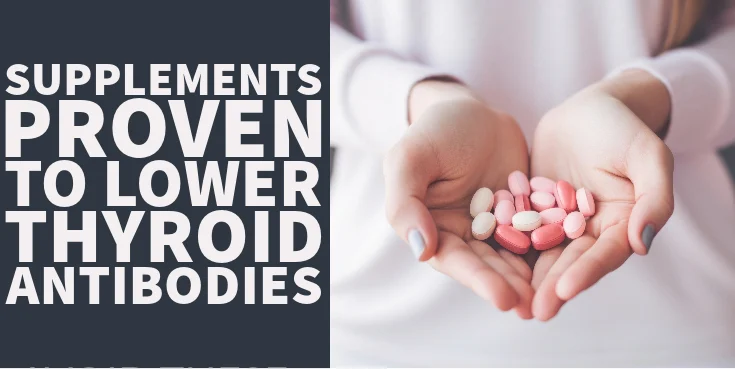
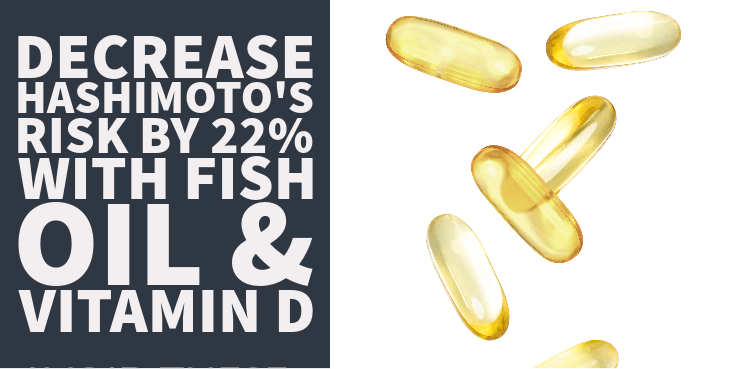


Complicated for sure. If my TSH levels are low (0.005) 12/20 & 10/21 & 5/22 0.011, then that indicates my D3 is high? Most recent 522, Free T3 2.9 n T4, 1.21. I have an apt. 9/12 with a functional endocreanologist. Hopefully she can sort out this mess. The new DO
I have was only concerned that I don’t take biotin, which 1600 mcg are
in my B vitamins & multi & Vital Reds. It sure isn’t causing falsely elevated TSH! I take Progesterone IR 150 mg. compounded capsules (4 a day) and 3 mg. of estradiol, I am 81. It said this is for dementia prevention and for my osteoporosis. Also prescribed 180 (30 NP thyroid
Hi Sue,
I’m not sure I understand the question regarding your vitamin D3 and your thyroid lab tests. You can have a high/low TSH and with a high/low vitamin D level. Most patients with hypothyroidism do have low vitamin D levels but it’s not a guarantee. If I am misunderstanding your question please let me know.
Just had my Vit D levels tested I take roughly 7,000 iu daily.
My level tested at 76 my interegrayed dr said that was fine my internist said back off by 1,000 ius. But I have hosimotos and have been fighting a real struggle after vaccination I am finally all in ck with everything what is your thought on my level being to high or ok. I use all your supplements and compound t3 t4
Plus take LDN 3 mlgs sleeping like a baby at night finally
Hi Tearesa,
Ideally, you’d want your vitamin D level to fall somewhere between 40-60 ng/mL. Having too much vitamin D can be a problem which is why staying in this range should be the goal.
I had a T.B.I. 1 yr. ago. I do TRE, sauna 5 x wk. a Bredesen dementia prevension lifestyle. I have no MCI symptoms to date. I am trying to be proactive. I am doing great at cutting out sugar, exercise, etc. I weigh 130, 5’5”. Got my circadian rhythm A+, walk 2 miles, eat all organic, grassfed, etc. but I will be more at peace when I get my thyroid numbers where they should be. Thank you.
Hi Sue,
I think that would be a great goal, especially considering the impact TBIs can have on pituitary function.
Hi Sue! I’ve been reading about Dr. Bredesen’s protocol recently and am very interested in your experience and thoughts. I am 50 experiencing dementia symptoms and my mom died from Alzheimers. Would you mind contacting me? I would greatly appreciate it!
jenjwilson03@gmail.com
I’d appreciate your perspective lets say a hypothetical client with TSH of 6, APO 130, 25 OH of 35 ng/ml but high 1, 25 OH of 120 pg/ml. Seem’s contraindicated to add more D3 when calcitriol is high, but then it also seems live getting 24 OH into range would better supportive immune & TSH regulation? Thoughts?
Just wondering why every time I supplement with vitamin D- I break out in a cystic type acne on the back of my neck into my hairline. I’ve use oral and topical- same result.
Hi Elizabeth,
It’s possible for vitamin D supplementation to make hormonal acne worse but it’s usually dose-dependent and it usually doesn’t appear on the back of the neck, at least not from what I’ve seen. I would consider decreasing your dose to see if that helps.
In my mid twenties I worked in Hawaii for two years. At this time I had no idea that my symptoms of slight fatigue were due to thyroid issues. In Hawaii I spent everyday out in the sun, walking and swimming in the ocean and eating lots of good foods. Like magic all those mysterious symptoms went away and I thrived. Within a year of leaving Hawaii I developed terrible hypo and had a partial removal. Even now I’ll do better on my Levo during the warm months because I’m a gardener and out in the sun a few times a week. In the warm months my D levels are as high as 80 but drop to 30 in the cold season and I certainly feel it! I believe getting activity in the sun for Vit D is one of the biggest keys to improving hypo. Of course this year Texas’ summer was brutal with consecutive days over 100 degrees and was impossible to spend much time outside!
I recently had my labs done. D3 is 22, Antibodies are 400, T3 is 91, Free T4 is 1.37, TSH right now is .271 which means I’ll probably need to reduce the amount of Levothyroxine I’m taking (it seems to fluctuate quite a bit). I’m just getting to know about Hashimotos and can’t find a doctor in my region to work with me on it. My question is about your supplements. I feel like a take too many meds as it is (depression/anxiety) and I don’t want to take more than I have to. Based on these numbers, which supplements do you think would be best for me?
Hi Jennifer,
This would be best for your situation: https://www.restartmed.com/product/hashimotos-bundle/
There’s a decent chance that if you can figure out your thyroid problems many of your other symptoms may resolve or improve which would warrant a change in your medications. No promises, obviously, but it’s well known that anxiety and depression are linked to decreased thyroid function.
There are only about 4 people who are discussing the toxicity of D3 in depth. Here’s a place to get started, and the podcast is very good.
Not taking Vitamin D – by Jim Stephenson Jr.
Jim Stephenson Jr | Substack https://substack.com/profile/73731074-jim-stephenson-jr
Podcast Matt Blackburn x Jim Stephenson Jr. The Science Behind Vitamin D Toxicity with Jim Stephenson Jr on Spotify https://open.spotify.com/episode/7xUB9R8OzbAdhFXSOk1DDD?si=jHwSLRvJSwCwf9ikdvaprA
I’ve been thinking about my own root causes and really re-evaluating what other causes there could be besides being D3 deficient. In fact, I was supplementing D3 and I think it could have CAUSED some of my problems with thyroid. But, even if it did not, I think it caused soft tissue calcification (a very big problem I had for years, which I thought was oxalate). So, we really need to be asking who we believe and why? Stephenson makes a good case.
Hi Rachel,
There’s no shortage of rabbit holes that you can go down in this world but the question always becomes, how much impact will any one thing have on your overall health? My experience suggests that altering your vitamin D level will have a very small clinical impact which means it’s probably not a worthwhile hole to dive down. There’s no question that altering your thyroid will have a huge impact on your overall health but things like MTHFR genetic mutations and issues with vitamin D will be relatively small in the grand scheme of things.
My advice is to keep an eye on your vitamin D level, optimize it with sun and supplements as necessary, and focus on more worthwhile things such as your diet, exercise routine, stress levels, quality of sleep, and so on. These will move the needle far more than small changes in your vitamin D level.
I live in Montana between two mountain ranges. Lots of overcast days with cold temperatures. Could I get vitamin D from Tanning lamps offered at my gym? I take vitamin drops and was able to increase my levels slightly but usually under 25. I noticed the diagrams reference the process “heat”, can you explain more here? Does this me sitting in the infrared sauna to generate heat could help? Also the liver and kidneys health impact your D levels? What could a person do to improve the health of liver and kidneys. Also diagram shows genes associated with the process, what impact does this play?
Hi Sher,
You could get some vitamin D from tanning lamps but you’d really only get any significant amount if they use UVB lights. There’s also a lot of question as to whether or not the benefits of using UVB tanning beds outweigh the potential cons. I’m not sure where you are seeing the term heat at, but if you can clarify I can let you know.
Hi Sher,
I just saw the heat portion that you mentioned. That just references the heat needed for the enzymatic reaction to proceed from previtamin D3 to vitamin D3. The rate limiting step is not the heat but the interaction with UVB from the sun. Heat is not sufficient to create D3 by itself, though.
How important is it to take Vitamin K2 with Vitamin D. I have been taking 5000 IU for years now, but have recently realized I should have been taking K2 along with it. And how much K2 should you be taking with 5000 IU?
Hi Roberta,
It depends on the situation. I really only see a clinical benefit in taking K2 with D3 if you have a history of osteoporosis or heart disease. If you want to add it you are welcome to. In terms of dosing, you can see an example of how I recommend using it in my Thyro ADK: https://www.restartmed.com/product/thyro-adk/
Is there a such thing as too much Vitamin D?
Hi Karen,
Absolutely, you can get too much of anything, including vitamin D.
Do you have to take vitamin K with vitamin D in order for it to be effective?
Hi Susan,
No. Vitamin K2 helps with calcium shuttling in the body which is impacted by vitamin D but they are not required to be taken together for either to be effective.
My husband had thyroid cancer 12 years ago. His thyroid was removed and he has been on Synthyroid 100 mcg and his TSH has been 0.4 to 1 and his free and reverse T3 and T4 have been in range. His vitamin D level runs 60-70. Suddenly after a trip to the S. Pacific last October his TSH jumped to 12 and in the 4 tests since then it has ranged from 12 -30. His T3 and T4 levels have remained the same. He has been scanned for cancer and is negative, his pituitary gland CT was clear. No one has an explanation for this and the only symptoms from this high TSH are difficulty sleeping and severe depression. I have followed you and use your supplements and I feel you know more about the thyroid than any endocrinologist. Do you have any ideas? Thank hou
Hi Dana,
Please see this article which may explain some of what he is experiencing: https://www.restartmed.com/you-cant-stay-on-the-same-thyroid-medication-dose-forever/
Can you do an article on where thyroid meds are made. Are any made in the USA or is it China (). I personally use NP Thyroid.
Would love to hear from you.
I received vitamin d3 10,000 units liquid in the mail by mistake ,I ordered vitamin a 10,000 units and it can not be returned. I am taking Armour thyroid 15 mg and my Hashimotos level is 8 with constipation and staying indoors mostly . Is it safe to take 10,000 units liquid form dropper full once a day. My diet has been poor lately and i feel I need a boost of energy.